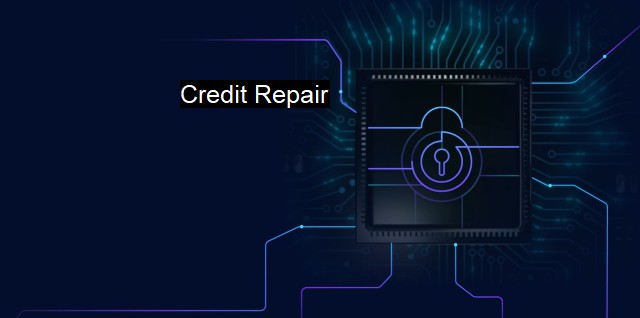What is Credit Repair?
Why Credit Repair Services are Crucial in the Fight Against Fraud and Identity Theft: Exploring the Intersection of Cybersecurity and Creditworthiness
Credit repair is the action or set of actions aimed at improving one's credit score. This is usually done by eliminating existing errors within a person’s credit report. In the cybersecurity context, credit repair can take on more critical importance due to instances of data breaches and other criminal activities which may cause harmful inaccuracies on credit reports. Cybersecurity and antivirus applications have become essential tools in preventative credit repair, providing an invaluable line of defense against potential threats.Credit repair often refers to reclaiming one's fiscal identity after an instance of identity theft or data breach. A credit repair service can help individuals monitor their credit and resolve any issues that arise due to fraudulent activity. They are looking for inaccuracies or warning signs that might indicate potential identity theft.
The process of credit repair itself involves assessing credit reports thoroughly and identifying areas that need correction or removal. Historically, this concept would mostly deal with human error; with the increasing prevalence and sophistication of cyber threats, the scope of credit repair has expanded. With cybersecurity threats on the rise, credit repair now also addresses incorrect information linked to fraudulent activities, misuse, hacking, and identity theft.
The primary factor of cybersecurity in credit repair is identity theft. Sophisticated hackers and cybercriminals use a wealth of tactics like phishing, malware exploitation, and man-in-the-middle attacks to obtain personal financial data. As a result of such breaches, individuals often find suspicious and unjust charges present on their credit reports, negatively impacting their fiscal records and credit scores.
In light of these threats, cybersecurity has adapted and expanded to protect personal and financial data. Nit only does a robust cybersecurity strategy help prevent unauthorized breaches, but it also identifies and resolves them if they occur. A person with a sound cybersecurity approach would be preemptively mitigating any drastic damage to their credit scores resulting from potential security breaches.
Security measures such as two-factor authentication, phishing email detection, secure server maintenance, periodic system audits, and encryption have become the norm for securing sensitive financial information. Antivirus software, network security, and data backups are also integral components to consider for good digital hygiene habits.
In addition to these enhanced measures, several firms also offer dedicated credit repair services. These services typically include regular monitoring of an individual's credit report along with cybersecurity and antivirus protection. Depending on the provider, these services will guide the person through any correction or dispute processes needed to manage their credit.
Importantly, even high-tech protective measures are not always impervious. Therefore, credit monitoring and repair also play significant roles, serving as a safety net when all else fails. A person can take control of the situation by scanning their financial and credit reports for any dubious entries or discrepancies and then proceeding to solutions involving dispute and rectification processes.
Credit repair in the current digital era goes beyond merely identifying and rectifying areas of financial discrepancy in credit reports. It has become intertwined with cybersecurity, incorporating defensive measures against hackers and cybercriminals who seek to compromise an individual's financial information. This all-encompassing approach, which brings together preventative and repair measures from the cyber-landscape, aims to foster a comprehensive, up-to-date, and accurate representation of an individual's credit health and simultaneously protect them from potential digital threats.

Credit Repair FAQs
What is credit repair?
Credit repair refers to the process of improving a person's credit score by identifying and correcting errors on their credit report, negotiating with creditors, and developing a plan to manage debts.Why is credit repair important in terms of cybersecurity and antivirus?
Credit repair is important in terms of cybersecurity and antivirus because a good credit score is an indicator of financial responsibility and stability, which is often a factor in determining a person's trustworthiness in the eyes of financial institutions and lenders. This can affect a person's ability to obtain loans, credit cards, or even employment. By improving their credit score, individuals can demonstrate their financial stability and reduce the risk of financial fraud and identity theft.Is credit repair legal?
Yes, credit repair is legal, but it is important to avoid credit repair scams or illegal tactics that promise quick fixes or guaranteed results. The Credit Repair Organizations Act (CROA) regulates credit repair companies and prohibits them from making false claims or charging upfront fees.How long does credit repair take?
The timeline for credit repair can vary depending on the complexity of a person's credit report and the strategies used to improve their credit score. Generally, it can take several months to see significant improvements in a credit score, but some individuals may see results sooner. It is important to work with a reputable credit counselor or credit repair company to develop a personalized plan and monitor progress over time.| | A | | | B | | | C | | | D | | | E | | | F | | | G | | | H | | | I | | | J | | | K | | | L | | | M | |
| | N | | | O | | | P | | | Q | | | R | | | S | | | T | | | U | | | V | | | W | | | X | | | Y | | | Z | |
| | 1 | | | 2 | | | 3 | | | 4 | | | 7 | | | 8 | | |||||||